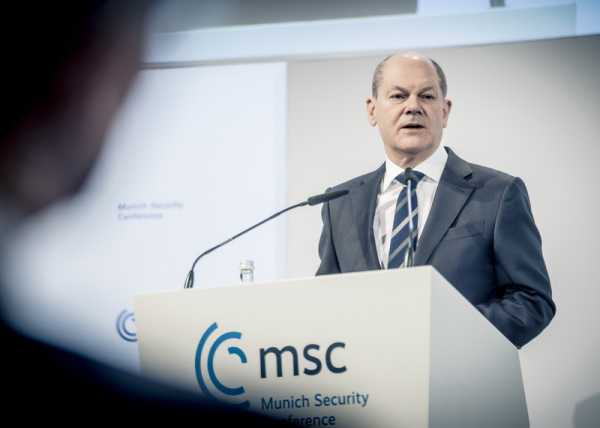
German chancellor Olaf Scholz, as the Munich Security Conference. Much of the government's new security strategy is so anodyne, it could easily be done by ChatGPT (Photo: securityconference.org)
Last week, Germany’s long-awaited National Security Strategy of Germany was released. Expectations were high, after months of delays and infighting among Berlin’s ‘traffic-light’ coalition partners.
Many observers excepted a roar, but heard only a mere whimper in the end. To put it mildly, the document is a nice compilation of already existing “strategic” documents, such as the Indo-Pacific guidelines, released in September 2020. But to make those documents of real value, the strategy should have begun with an honest reflection on what went wrong and on the distorted perceptions which have shaped German foreign relations since 1990.
Simple references to noble principles, such as rules-based multilateralism, might be good for the bedside prayers of German policymakers, but they remain far away from where real strategic discussion must begin.
And this discussion requires the courage to get rid of lifelong lies, such as Germany one day obtaining a permanent seat in the United Nations Security Council, and instead concentrate on achievable goals.
Further, it is hard to believe that this paper will be the starting point of a broader public discussion on the objectives of German foreign policy within a European framework. Compared to the much-acclaimed “Zeitenwende”, the language of the strategy, let alone its concrete proposals, is much softer in tone.
One might benevolently interpret this as the result of endless rounds of inter-ministerial coordination.
But closer to the truth is that there are simply no new ideas on Germany’s future foreign relations. Reaction is and will remain the modus operandi, partially out of a lack of capacities, and partially because acting in a courageous and decisive manner in foreign affairs can still spell political suicide for German politicians. The ‘Deutscher Michel’ might be willing to contribute financially, but largely wishes to remain uninvolved in the world’s quarrels.
Expectations by European partners for German leadership will again go unfulfilled. A pathetic paragraph on the Franco-German friendship (unwillingly?) reflects the near brain-death of the former engine of European integration.
There is an absence of any forward-looking reflection on the consequences of a radically changing power geometry within the European Union and how Germany should proactively adjust to it.
Incidentally, within German and European expert circles, discussions on Germany’s future objectives and the necessary steps to be taken are already much more advanced.
Highlighting a few key points may serve the analysis at this stage: a clear signal that the writings on the geopolitical wall had been read could have been a concrete proposal for a reform of institutional structure of German foreign and security policy.
The fragmentation between different ministries and state agencies has been criticised for years as no longer being suitable in a radically different global environment. Repeated demands for an overhaul of competences and resource allocation trudged along slowly between different ministries.
The establishment of a National Security Council has been brought forward for years — in vain.
Lack of policy coordination continues on the ground abroad. The paper correctly acknowledges that the huge financial contributions of Germany to international organisations and third countries don’t translate in appropriate political leverage.
But here again, different line responsibilities, institutional cultures and the lack of shared understanding of objectives prevent a larger and long-lasting impact.
Bloodless
Moving further to the European level, Germany often claims to be the model boy of European integration.
Given recent developments in European foreign, security and defence policy, the reference to the EU Common Foreign and Security Policy (CFSP) and the Strategic Compass remains rather bloodless. If not now, when should have been the time for more concrete proposals for a future European defence and security architecture.
And then comes the budget. You don’t have to be a number cruncher to realise that the current defence budget of two percent of GDP, including the special fund for the Bundeswehr, are far from covering the promised contribution on the way to becoming Europe and Nato’s logistics turntable.
And dilemmas of resource allocation in times of economic recession and rising public debt should be put on the table to initiative public debate.
Sign up for EUobserver’s daily newsletter
All the stories we publish, sent at 7.30 AM.
By signing up, you agree to our Terms of Use and Privacy Policy.
Where people and our allies need more clarity, is the ‘hard power’ of Germany’s engagement. In terms of future weapons development, the impact of cutting-edge technologies such as AI, and control on arms exports, the strategy seems to be avoiding any clear position — a clear result of long-term disputes among the governing parties.
But those restrictions will not enhance Germany’s “interoperability” among its allies. The same goes for the German intelligence service, whose scope of operations has been systematically crippled in recent years by decisions of the Federal Constitutional Court.
All in all, the real objective of understanding the fundamentally changing nature of threats, how they interact with each other and what new instruments are needed, cannot be achieved, because the necessary work simply has not been done. Listing well-known problems and phrases don’t make for an integrated, forward-looking strategy.
Perhaps the time for national strategies is past.
This paper, conceptually-speaking, is one of the weakest documents released by the German government in recent years. One can’t help but call it a true waste of the capacities of highly-qualified and well-paid civil servants, having spent months and years drafting a paper of very limited use. These days, such an exercise could easily be done by ChatGPT.
In other words, don’t expect much from Germany’s new strategy on China, which we’ve also been waiting on for more than a year.
Source: euobserver.com



